I Saw the Light
 for some language and brief sexuality/nudity.
for some language and brief sexuality/nudity.
Reviewed by: Bob Subjenski
CONTRIBUTOR
| Moral Rating: | Offensive |
| Moviemaking Quality: |
|
| Primary Audience: | Adults |
| Genre: | Biography Music Drama Adaptation |
| Length: | 2 hr. 3 min. |
| Year of Release: | 2016 |
| USA Release: |
March 25, 2016 (limited—5 theaters) April 1, 2016 (wider—55+ theaters) DVD: July 5, 2016 |
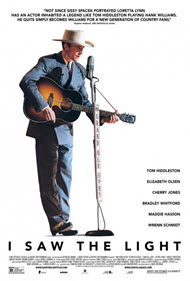

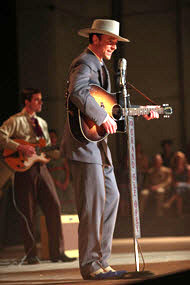
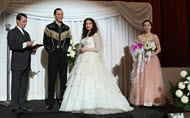
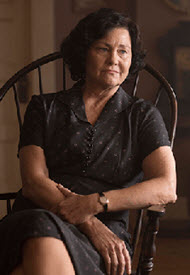

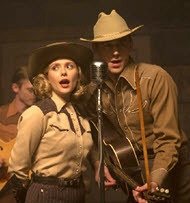
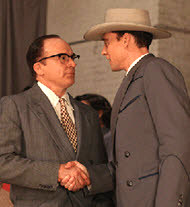

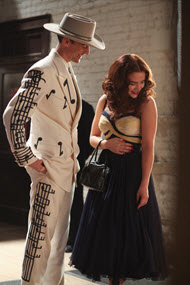

This film is based on the book Hank Williams: The Biography by Colin Escott, George Merritt, and William (Bill) MacEwen.
music in the Bible
spina bifida birth defect
dealing with physical pain
drunkenness in the Bible
sin and the fall of man
Why does God allow innocent people to suffer? Answer
What about the issue of suffering? Doesn’t this prove that there is no God and that we are on our own? Answer
Does God feel our pain? Answer
ORIGIN OF BAD—How did bad things come about? Answer
Did God make the world the way it is now? What kind of world would you create? Answer
| Featuring |
|---|
|
Tom Hiddleston … Hank Williams Elizabeth Olsen … Audrey Williams Bradley Whitford … Fred Rose Cherry Jones … Lillie Williams Maddie Hasson … Billie Jean Jones Wrenn Schmidt … Bobbie Jett David Krumholtz … James Dolan Josh Pais … Dore Schary Wes Langlois … Don Helms - Steel See all » |
| Director |
| Marc Abraham—producer of “In Time” (2011), “Children of Men” (2006), and “Dawn of the Dead” (2004) |
| Producer |
|
Bron Studios RatPac Entertainment |
| Distributor |
“I Saw the Light” is the title of the new movie focusing on the last seven years of legendary country singer and song writer Hiram King “Hank” Williams (Tom Hiddleston). Hank Williams’ story is very familiar to the majority of people who follow country music, and so the movie’s ending should come as no surprise to those who see it. The film’s main focus is on his rise to fame while enduring personal battles with alcohol, drugs, health and personal relationships.
The film opens with a snippet of a black-and-white interview, which establishes that what follows are scenes of Williams’ life told in chronological flashback format. We are introduced to the main character as a very popular local artist who impulsively marries his longtime manager Audrey Sheppard (Elizabeth Olsen), an inspiring country singer herself.
As the movie progresses, we see Williams’ career rise, accompanied with increasing turmoil in his personal life—including major relationship problems with his extremely overbearing and possessive mother, Lillie Williams (Cherry Jones). Severe back pain caused by spina bifida (a spinal birth defect) contributes to his reliance on alcohol and drugs to ease the physical pain.
The Williams’ welcome a son, Hank Williams Jr. into their life, which temporary helps Hank Sr. clean up his life, but, unfortunately, the resumption of his habits takes its toll on the marriage, leading to several incidents of infidelity and eventually to an extremely volatile divorce. After several failed attempts to reconcile with his wife, Williams begins a series of relations with various women, eventually marrying a young girl of 19.
The movie ends at a concert hall filled to capacity with adoring fans waiting for a New Years Day concert, receiving the sad announcement that on the way to the concert he suffered heart failure leading to his untimely death. The last scene is of him singing his hit gospel song “I Saw the Light,” which is where the movie gets its title.
Objectionable content
There is objectionable language, spoken by various characters, both profanity and vulgarity: “Jesus” (1), “g*d d*mn” (1), “my g*d” (2), OMG (1), “swear to g*d” (2), “for g*d’s sakes” (1), “god” (1), “d*mn” (20+), “h*ll” (15+), f-words (3), s-words (12), a**hole (1), a** (4), and SOB (5).
The movie’s emphasis seemed to be less on Williams’ talent and more on his abuses. Much is made of the personal demons he fought, but little time is given to why he struggled with them.
There is a brief scene where a woman Williams is cheating with is seen topless, and there are several scenes showing him in physical relationships with his wife and other women.
God is nearly absent from this movie, with a brief mention early on by Williams that he was raised in church and got his start as a musician/singer in church, and, at the very end, his hit Gospel song is sung.
Positive lessons
The movie shows that all the fame, fortune and talent he had failed to give Hank Williams true and lasting happiness. This failure opens a wide door to explain how we can have joy despite our circumstances.
Be happy in the Lord. And He will give you the desires of your heart. —Psalm 37:4
The movie does not glamorize alcohol and drug abuse in any way, and actually does a good job of showing how they can lead to disaster in a person’s life. His downfall can help emphasize the value of God’s word.
Do not get drunk with wine. That leads to wild living. Instead, be filled with the Holy Spirit. —Ephesians 5:18
I wish I could recommend this movie as an enjoyable 2 hours, but, unfortunately, it only left me with feelings of sadness, hopelessness and aloneness. While that might be the reaction those involved with it's production wanted it was not what I was looking for in this movie. While it’s refreshing to see a movie relying on acting and storytelling, instead of a bombardment of special effects to keep its audiences’ attention, the producers of “I Saw the Light” seem to swing too far and have presented a movie that will generally appeal only to hardcore Hank Williams fans, but not the casual moviegoer. This film is geared to an older, mature audience which isn’t easily offended by multiple instances of swearing and vulgarity. I would definitely NOT bring young children to see it.
Violence: Mild / Profanity: Moderate to heavy / Sex/Nudity: Heavy
See list of Relevant Issues—questions-and-answers.


PLEASE share your observations and insights to be posted here.

